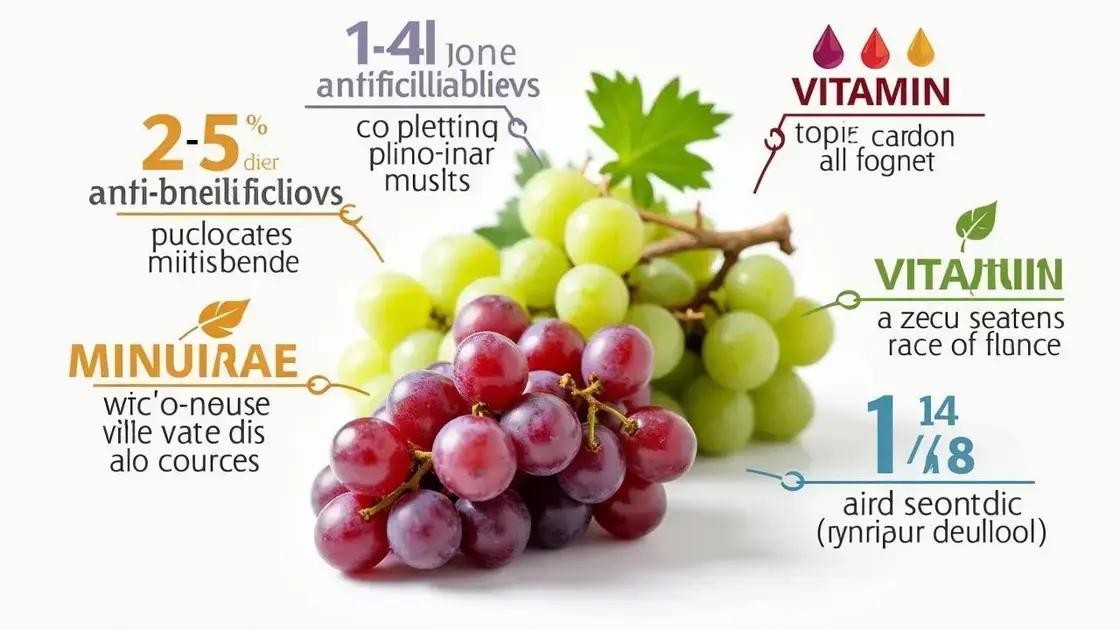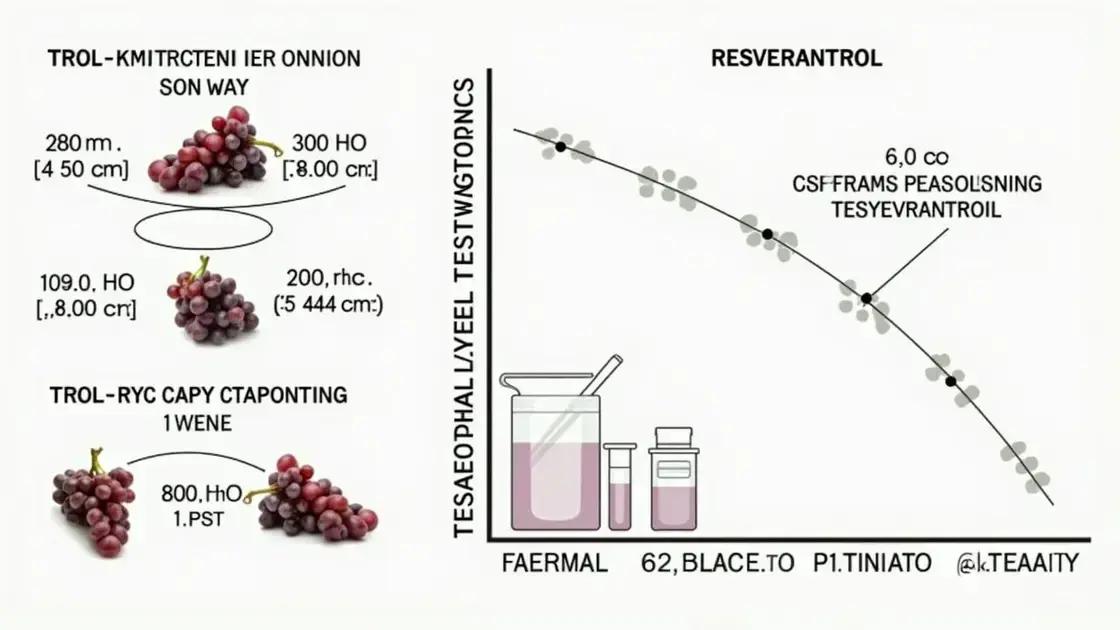Yes, grapes may improve testosterone levels due to their high content of resveratrol and antioxidants, which can support hormonal health. Incorporating grapes into your diet, along with regular exercise, stress management, and adequate sleep, can contribute to overall testosterone balance and well-being.
Can grapes improve testosterone levels? This question has piqued the interest of many health enthusiasts. Testosterone is a vital hormone, influencing not only muscle mass and libido but also overall health. Recent studies suggest that certain foods, including grapes, might play a role in naturally boosting testosterone. In this article, we will delve into the nutritional benefits of grapes, explore research findings, and discuss natural ways to enhance testosterone levels effectively.
Understanding Testosterone and Its Importance

Understanding Testosterone and Its Importance
Testosterone is a hormone that is crucial for various bodily functions in both men and women. It plays a vital role in the development of male reproductive tissues, such as the testes and prostate. This hormone also promotes secondary sexual characteristics, including increased muscle and bone mass, as well as the growth of body hair.
In men, testosterone levels naturally peak in adolescence and early adulthood, gradually declining with age. This decline can lead to various health issues, including decreased libido, fatigue, and loss of muscle mass. For women, testosterone is essential too, although in lower amounts. It helps maintain bone density and contributes to overall health and well-being.
Adequate testosterone levels are essential for optimal health. Low testosterone can affect mood, energy levels, and cognitive function. It can also lead to an increased risk of chronic diseases like obesity, diabetes, and cardiovascular issues. Therefore, understanding the significance of testosterone is crucial for maintaining a healthy lifestyle.
Factors such as diet, exercise, and stress can impact testosterone levels. Research indicates that certain foods and lifestyle choices can help keep testosterone levels balanced, potentially leading to improved health outcomes.
The Nutritional Profile of Grapes

The Nutritional Profile of Grapes
Grapes are a small but powerful fruit packed with nutrients. They are low in calories and high in various vitamins and minerals. A cup of grapes contains about 104 calories, making them a healthy snack option. Vitamins found in grapes include vitamin C, vitamin K, and several B vitamins like B6 and thiamine.
Furthermore, grapes are rich in antioxidants, notably flavonoids and resveratrol. Resveratrol, in particular, has gained attention for its health benefits and its potential role in promoting cardiovascular health. The antioxidants in grapes can help combat oxidative stress in the body, which may support overall health.
Another significant aspect of grapes is their fiber content. A serving provides about 1.4 grams of fiber, which aids digestion and may help maintain healthy cholesterol levels. The presence of natural sugars in grapes also makes them a quick source of energy.
Minerals such as potassium and manganese found in grapes are also beneficial. Potassium helps in managing blood pressure and supports heart health, while manganese plays a role in bone formation and metabolic processes.
Incorporating grapes into your diet can not only satisfy your sweet tooth but also provide various health benefits that may contribute to a healthy testosterone level and overall well-being.
Research on Grapes and Testosterone

Research on Grapes and Testosterone
Studies have begun to explore the relationship between grapes and testosterone levels. One significant focus is on the compound called resveratrol, which is abundant in grape skins. Research suggests that resveratrol may have a positive impact on hormone levels, including testosterone.
A study published in the Journal of Nutritional Biochemistry found that resveratrol can stimulate the Leydig cells in the testes, which are responsible for testosterone production. This means that consuming grapes or resveratrol supplements could potentially enhance testosterone levels in men.
Another research area looks at the overall antioxidant properties of grapes and their effects on testosterone. Antioxidants help reduce oxidative stress in the body. High levels of oxidative stress can lead to a decline in testosterone levels. By lowering oxidative stress, antioxidants in grapes might help maintain healthy testosterone levels.
Moreover, a study examining the diets of men who consumed grapes regularly found a potential link between increased grape intake and higher testosterone levels. While this does not conclusively prove a direct causation, it highlights the need for more research in this area.
It is vital to note that while initial studies are promising, more extensive and controlled human studies are required to fully understand the effects of grapes on testosterone levels. Overall, the current research adds to the growing evidence that grapes can play a beneficial role in health, including hormonal health.
Natural Ways to Increase Testosterone

Natural Ways to Increase Testosterone
Boosting testosterone levels naturally involves various lifestyle changes and dietary adjustments. Here are some effective strategies:
1. Regular Exercise
Engaging in physical activity, especially strength training and high-intensity interval training (HIIT), can help raise testosterone levels. Lifting weights and performing bodyweight exercises stimulates muscle growth, which is linked to increased hormone production.
2. Healthy Diet
Eating a balanced diet rich in whole foods can significantly impact testosterone levels. Focus on consuming:
- Healthy Fats: Include sources of healthy fats like avocados, nuts, olive oil, and fatty fish. Omega-3 fatty acids may enhance testosterone production.
- Protein: Aim for adequate protein intake from lean meats, fish, legumes, and dairy. This is essential for maintaining muscle mass.
- Fruits and Vegetables: Incorporate a variety of colorful fruits and vegetables to ensure a good intake of vitamins and minerals.
3. Manage Stress
High stress levels can lead to increased cortisol production, which negatively impacts testosterone. Incorporate stress-reducing practices such as meditation, yoga, and deep-breathing exercises into your daily routine.
4. Quality Sleep
Prioritize getting enough sleep each night, as poor sleep can lower testosterone levels. Aim for 7 to 9 hours of quality sleep to support hormone balance.
5. Minimize Alcohol and Drug Use
Excessive use of alcohol and drugs can harm testosterone levels. Moderating your consumption of these substances can have positive effects on your body’s hormone production.
By integrating these natural methods into your lifestyle, you can contribute to improved testosterone levels and overall health.
Conclusion: Grapes as a Healthy Choice

Conclusion: Grapes as a Healthy Choice
Grapes are more than just a tasty snack; they offer a wide array of health benefits. Their unique nutritional profile, rich in vitamins, antioxidants, and fiber, makes them an excellent addition to any diet.
Research has indicated a potential link between grape consumption and improved testosterone levels, primarily due to the presence of resveratrol and other beneficial compounds. By adding grapes to your diet, you can enjoy these potential hormonal benefits while also reaping the general health advantages that come from a diet rich in fruits.
In addition to being a delicious option, grapes are versatile and can be enjoyed in various ways—fresh, dried as raisins, or added to salads and smoothies. They can complement a healthy lifestyle and contribute to overall well-being, including maintaining balanced hormone levels.
Whether you’re looking to improve your health or simply enjoy a sweet treat, grapes are a healthy choice that can fit easily into your daily routine.
In Summary: Embracing Grapes for Health
In conclusion, grapes are a delicious and nutritious fruit that can potentially support hormone health, particularly testosterone levels. Their rich nutritional profile, which includes essential vitamins, antioxidants, and fiber, makes them an excellent choice for anyone looking to enhance their overall well-being.
Research on grapes and their components, particularly resveratrol, highlights their possible role in promoting healthier testosterone levels. Integrating grapes into your diet can be a simple and enjoyable way to take advantage of their health benefits.
Additionally, practicing other natural methods to boost testosterone, such as regular exercise, managing stress, and maintaining a balanced diet, can further enhance your health journey. By making grapes a regular part of your meals or snacks, you not only satisfy your taste buds but also support your hormone health and overall wellness.
So, embrace grapes as a healthy choice, and enjoy the many benefits they offer!
FAQ – Frequently Asked Questions about Grapes and Testosterone
Can grapes really improve testosterone levels?
Research suggests that resveratrol and other compounds in grapes may have a positive impact on testosterone production, but more studies are needed to confirm this.
What are the nutritional benefits of grapes?
Grapes are rich in vitamins, antioxidants, and fiber, providing health benefits like improved heart health, digestion, and possibly hormonal support.
How can I incorporate more grapes into my diet?
You can enjoy grapes fresh, dried as raisins, in salads, smoothies, or as a natural sweetener in various dishes.
Are there other foods that help increase testosterone levels?
Yes, foods rich in healthy fats, proteins, and antioxidants, like lean meats, nuts, and avocados, can also support testosterone production.
What lifestyle changes can I make to boost testosterone naturally?
In addition to eating healthy foods like grapes, regular exercise, managing stress, and getting sufficient sleep are crucial for maintaining healthy testosterone levels.
Is there any risk associated with consuming too many grapes?
While grapes are healthy, consuming them in moderation is key. Overeating any fruit can lead to excess sugar intake, which may not be beneficial.












